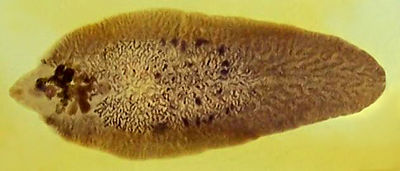Fasciola hepatica
| Also known as: | Liver Fluke |
Introduction
Fasciola Hepatica is an hepatic parasite found in mainly in ruminants, namely cows, sheep and goats, but also known to affect horses and pigs. It is found Worldwide, and within the UK, with its prevalence ever increasing. It is responsible for a 10-15% production loss in each infected animal, as it affects meat, milk and wool production, so is of huge economic consequence.
Fasiola Hepatica has a definitive ruminant mammalian host and an intermediate molluscian host. Within Europe the intermediate host is almost exclusively the snail 'Lymnaea truncatulata'. The snail habitat is crucial to the survival of the parasite, so wet conditions are favourable to the development and spread of Fasciola hepatica
Scientific Classification
| Kingdom | Animalia |
| Phylum | Platyhelminthes |
| Class | Trematoda |
| Subclass | Digenea |
| Order | Echinostomida |
| Family | Fasciolidae |
| Genus | Fasciola |
| Species | F. Hepatica |
Pathogenesis
The severity of the infection is mainly dependent on the number of metacercariae ingested. The Pathogenesis is often described as two-fold. The first stage occuring when the parasite migrates through the liver parenchyma, causing liver damage and haemorrhage. The second phase occurs when the parasite is in the bile ducts, and damage is a result of the haematophagic activity of the adult flukes.
References
Taylor, M.A, Coop, R.L., Wall,R.L. (2007) Veterinary Parasitology Blackwell Publishing
G.L. Pritchard et al., Emergence of fasciolosis in cattle in East Anglia, The Veterinary Record, Novemeber 5, 2005.
